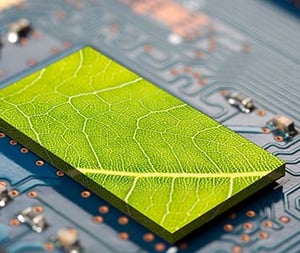IP rights: what form of protection is important ?
 As a company in the cleantech sector it is important to adequately protect your intellectual property rights. However there are various forms of protection available, some of which are more suitable for technological innovations than others. You are only assured of your rights as long as you have the right form of protection. For mission-driven companies in the cleantech sector that want to widely disseminate their technology, a patent is very important.
As a company in the cleantech sector it is important to adequately protect your intellectual property rights. However there are various forms of protection available, some of which are more suitable for technological innovations than others. You are only assured of your rights as long as you have the right form of protection. For mission-driven companies in the cleantech sector that want to widely disseminate their technology, a patent is very important.
Different forms of protection
There are different forms of intellectual property protection available, such as copyright, trademark protection, trade name protection, design protection and patent protection, says Jeroen Meesters, a recognised Dutch and European Patent Attorney at EP&C. Each form has its own specific features and protects different types of intellectual property (IP) rights.
"First of all, there is copyright law. This automatically protects original work of a creative nature. This can range from books and music to certain elements of software, such as source and object code. These works are copyrighted up to 70 years after the creator's death.
Secondly, there is also such a thing as trademark protection. This form of intellectual property protection provides an exclusive right to products, company names, services, logos and so on and can be obtained through trademark registration. This provides protection for 10 years and can be renewed indefinitely.
Thirdly, trade name protection protects business names that are not registered as trademarks. This protection is weaker than trademark protection and applies only in the region in which the company operates. It lasts as long as the company's name is used.
Fourthly, there is design protection which can be obtained for an innovation with a distinctive design, as long as that design has no technical function and is therefore purely aesthetic. If this is the case, you can protect the design by means of a design right for a maximum period of 25 years.
Finally, there is patent protection. This is important for inventions that solve a technical problem and lasts for up to 20 years. It is the only form of protection that protects the innovative technology as such.
The patent: protecting intellectual property rights tailored to cleantech
The cleantech sector is a dynamic and innovative sector with companies developing and producing technologies for a sustainable future. Because of the substantial investment required for research and development of new technologies, intellectual property rights are of crucial importance for companies in this sector. Patents play a very important role in this according to Jeroen.
"Patents protect technical innovation at three levels: the product, the method or process and the application. At the product level, this can be about simple innovations like plastic caps but equally about high-tech and complex hardware and systems. The second level, that of methods or processes protects innovations in the production process such as modifications that make the process faster and more energy efficient. Finally, it is also possible to protect new applications for existing products by means of a patent.
With a patent, you have control over your invention and can market it in the most attractive way. A patent protection lasts for 20 years as long as you pay an annual fee in the country where the protection applies. As these costs soon mount up companies often decide to let the patent lapse because they feel it is no longer worthwhile holding on to it.
A patent: broad protection of intellectual property rights for broad dissemination of cleantech
Patents provide protection for the actual technology itself which, according to Jeroen, makes them essential for companies in the cleantech sector that want to disseminate their technology as broadly as possible. He feels that patents have a very important role for mission-driven companies, particularly in the cleantech sector.
"Companies driven by an environmental or sustainability mission are in a better position to achieve this with a patent that protects their intellectual property as this allows them to disseminate their technology more broadly. Through the patent they have control over their invention and can determine who can and cannot use it. Moreover, obtaining patents can help attract investors. It is therefore vitally important that companies in the cleantech sector understand the value of patents and make proactive efforts to protect their intellectual property rights."

About the author
My journey into intellectual property started during my graduation project on nanotechnology at IMEC, where I first encountered the world of patents. The seamless intersection of technology and law...
More about Jeroen >